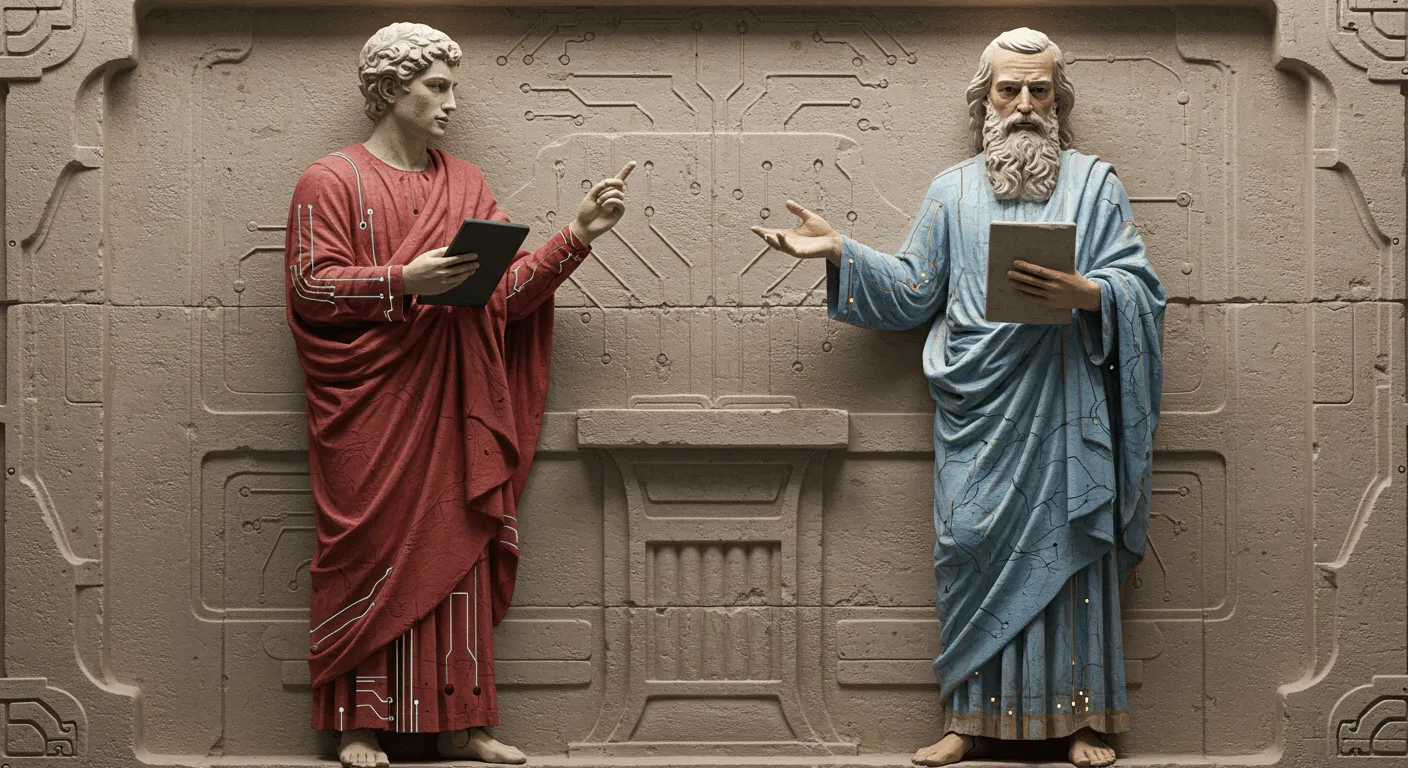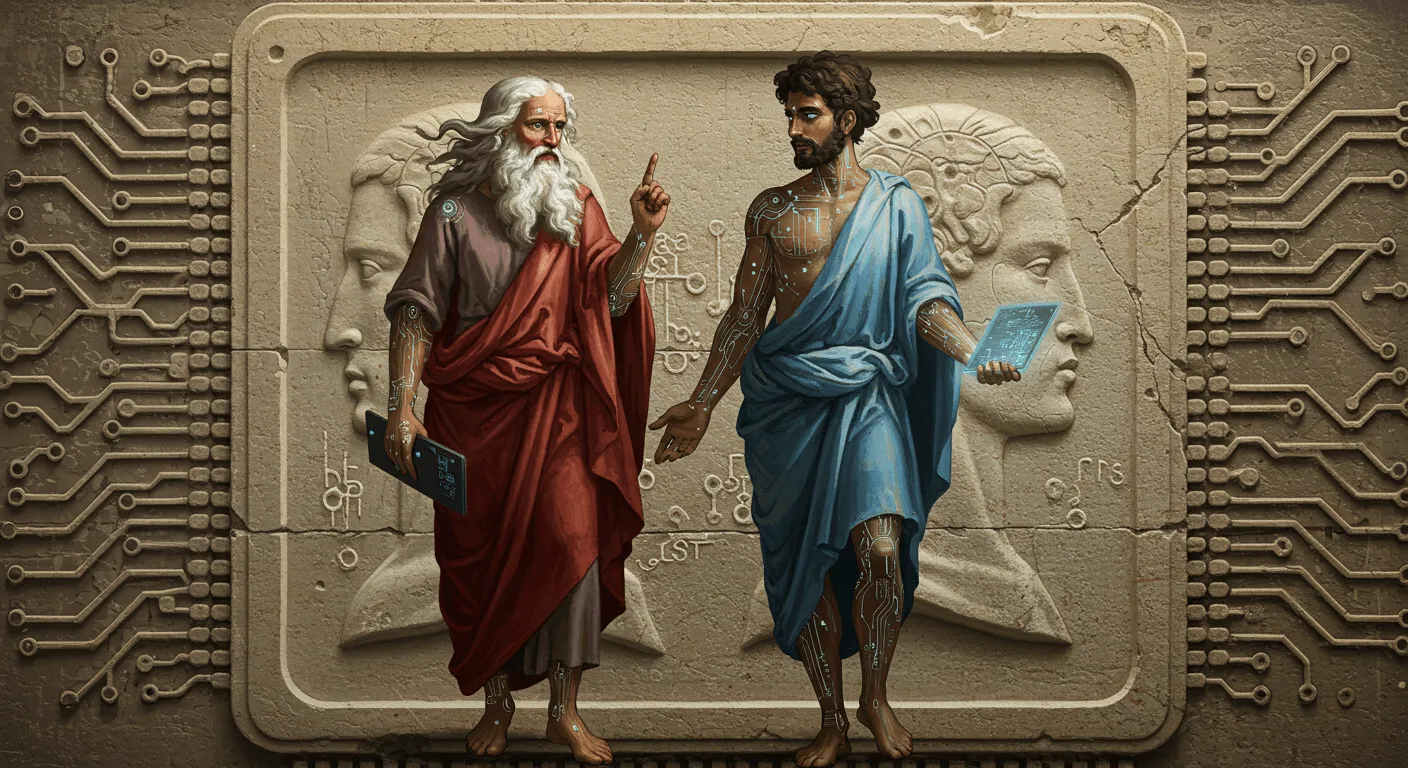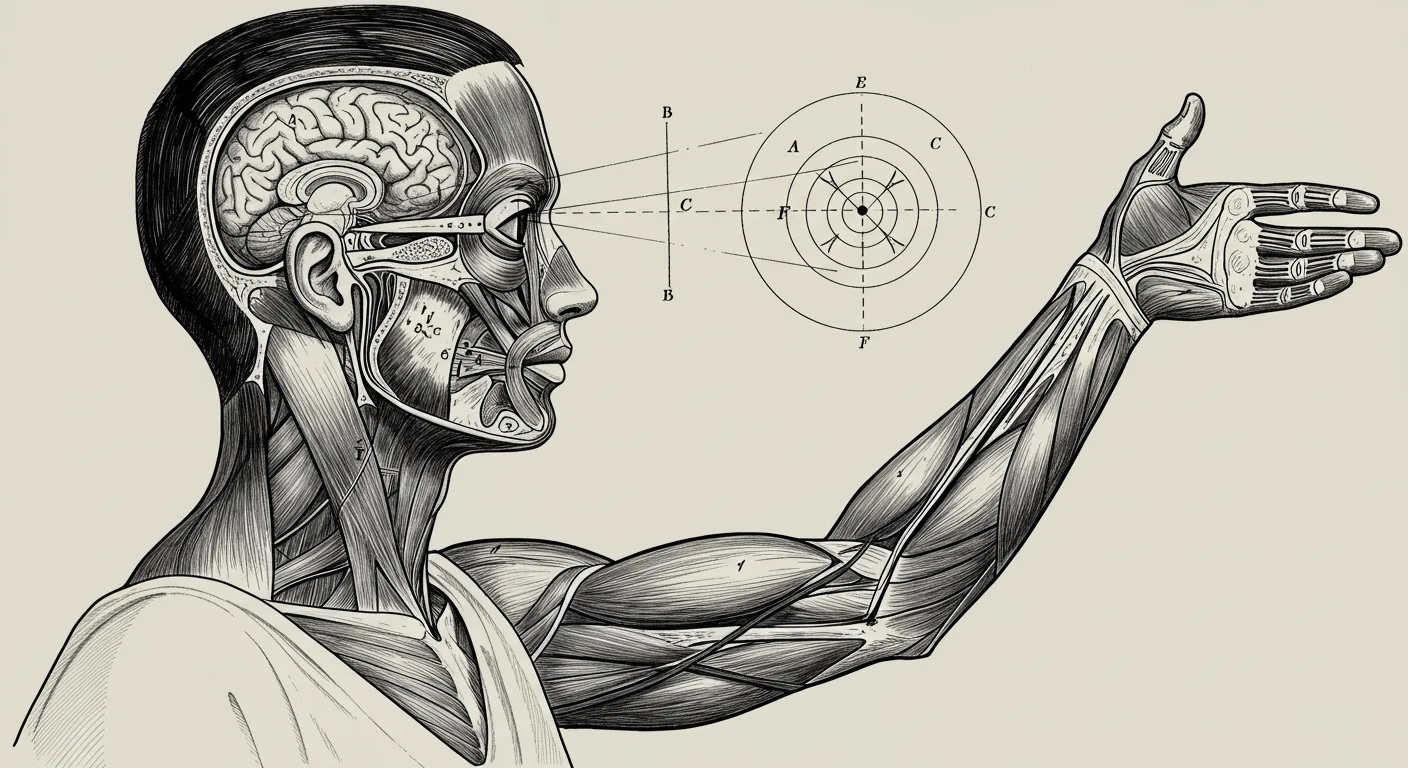Ancient Code: Greek Philosophy & Future AI

The Ancient Code: How Greek Philosophers Programmed the Future of AI
What if the deepest debates in artificial intelligence were settled 2,500 years ago in the olive groves of Athens?
Every breakthrough in modern AI—from neural networks recognizing faces to symbolic systems playing chess—can be traced back to an intellectual war that began in ancient Greece. Two titans of philosophy, separated by centuries but united in their pursuit of understanding how knowledge works, unknowingly laid the blueprints for every AI system we use today.
The Great Divide: Aristotle vs. Plato's Vision
Picture the ancient world: Aristotle walks through the Lyceum, carefully observing plants, animals, and natural phenomena, believing that all knowledge comes from experience and observation. Meanwhile, Plato sits in his Academy, convinced that true understanding comes from reasoning about eternal truths that exist beyond the messy, imperfect world of the senses.
This wasn’t just philosophical speculation—it was a fundamental disagreement about how minds work and how knowledge is acquired. Aristotle championed empiricism: we learn by gathering data from the world around us. Plato advocated rationalism: we discover truth through pure reasoning about abstract principles.
Sound familiar? It should. These ancient Greeks were essentially debugging the source code of intelligence itself.

Aristotle's Empiricism: The Neural Network Prophet
Aristotle believed the mind was a blank slate—a tabula rasa—that gained knowledge through experience. Watch a child learn to recognize their mother’s face, he might argue, and you’re seeing empiricism in action. The mind builds understanding by processing countless examples, finding patterns, and gradually developing the ability to generalize from specific experiences.
Fast-forward 2,400 years, and you’ll find Aristotle’s fingerprints all over modern neural networks. Deep learning systems don’t start with built-in knowledge about cats or conversations or chess moves. Instead, they begin as blank computational slates, learning entirely through exposure to vast amounts of data.
When a neural network learns to recognize images by processing millions of labeled photographs, it’s following Aristotle’s empirical playbook perfectly. No programmer explicitly teaches it what makes a cat look like a cat—the system discovers these patterns through experience, just as Aristotle believed all genuine knowledge must be acquired.
Plato's Rationalism: The Symbolic AI Architect
Plato saw things differently. He believed true knowledge existed in a perfect realm of abstract forms and ideas, accessible through reason rather than observation. The messy, imperfect world of the senses was just shadows on a cave wall—distractions from the pure mathematical and logical truths that could be discovered through careful reasoning.
This rationalist approach became the foundation of symbolic AI—the branch of artificial intelligence that dominated the field for decades. Symbolic AI systems don’t learn from examples; they operate by manipulating abstract symbols according to logical rules, much like Plato’s ideal of reasoning from first principles.
When IBM’s Deep Blue defeated world chess champion Garry Kasparov in 1997, it wasn’t because the system had learned from millions of games (though it had studied many). Instead, it used symbolic reasoning—evaluating positions through logical rules about chess strategy, calculating potential moves through pure computational reasoning, exactly as Plato might have envisioned intelligence working.
The Two Paths Diverge
For most of AI’s history, these philosophical approaches led to competing research programs. The empiricists built systems that learned from data—neural networks that could recognize patterns but struggled to explain their reasoning. The rationalists created systems that manipulated symbols and followed logical rules—expert systems that could explain their thinking but struggled with messy, real-world problems.
The divide ran deep. Empirical AI researchers believed intelligence emerged from processing experience, while symbolic AI researchers believed it came from manipulating abstract representations of knowledge. Conferences were divided, funding went to different camps, and for decades, the field essentially recreated the ancient Greek philosophical split in silicon and code.
The Modern Synthesis: Ancient Wisdom Reunited
Today’s most powerful AI systems suggest that both ancient philosophers were partially right. Large language models like GPT use neural networks (Aristotle’s empirical approach) trained on vast amounts of text, but they also demonstrate something remarkably close to symbolic reasoning (Plato’s rationalist approach) when they solve math problems or follow logical arguments.
We’re witnessing the computational reunification of ideas that were split apart in ancient Athens. Modern AI doesn’t have to choose between learning from experience and reasoning from principles—it can do both simultaneously.
Consider how a large language model approaches a complex question. It draws on patterns learned from massive amounts of text (pure empiricism), but it also engages in step-by-step logical reasoning (pure rationalism). The system embodies both Aristotle’s belief that knowledge comes from experience and Plato’s conviction that intelligence involves reasoning about abstract relationships.
The Deeper Pattern
What’s remarkable isn’t just that ancient philosophical debates shaped modern AI—it’s that they reveal something fundamental about intelligence itself. Whether biological or artificial, intelligence seems to require both the ability to learn from experience and the capacity for abstract reasoning.
Human children demonstrate this beautifully. They learn language empirically by hearing countless examples of speech, but they also engage in rationalist reasoning when they figure out grammatical rules they’ve never been explicitly taught. We are simultaneously Aristotelian pattern-matching machines and Platonic reasoning engines.
The Philosophical GPS
At HarrisonAIX, we believe these ancient Greeks gave us more than just intellectual frameworks—they provided a kind of philosophical GPS for navigating the landscape of intelligence. Every time we build an AI system, we’re implicitly choosing a position in the empiricism-rationalism spectrum. Every breakthrough in the field can be understood as a new synthesis of these ancient insights.
The next time you interact with an AI system, remember: you’re not just using modern technology. You’re engaging with ideas that were first debugged in ancient Athens, refined through centuries of philosophical debate, and finally implemented in the digital realm.
The Greeks may not have had computers, but they were already programming the future of artificial intelligence, one philosophical argument at a time. In the end, perhaps the most artificial thing about AI is how we’ve forgotten that its deepest roots stretch back to the very origins of human thought about thought itself.


